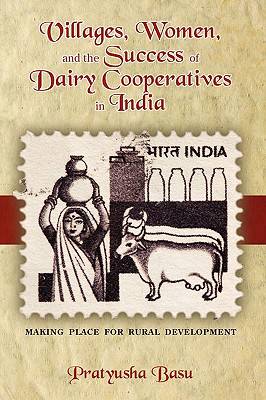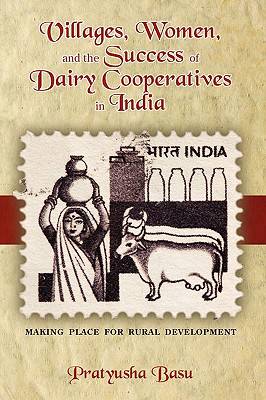
Door een staking bij bpost kan je online bestelling op dit moment iets langer onderweg zijn dan voorzien. Dringend iets nodig? Onze winkels ontvangen jou met open armen!
- Afhalen na 1 uur in een winkel met voorraad
- Gratis thuislevering in België vanaf € 30
- Ruim aanbod met 7 miljoen producten
Door een staking bij bpost kan je online bestelling op dit moment iets langer onderweg zijn dan voorzien. Dringend iets nodig? Onze winkels ontvangen jou met open armen!
- Afhalen na 1 uur in een winkel met voorraad
- Gratis thuislevering in België vanaf € 30
- Ruim aanbod met 7 miljoen producten
Zoeken
Villages, Women, and the Success of Dairy Cooperatives in India Making Place for Rural Development
Pratyusha Basu
Hardcover | Engels
€ 149,45
+ 298 punten
Omschrijving
India's cooperative dairying program is widely celebrated as an example of successful rural development, yet the meanings of this success have been understood mainly through the pronouncements of national and international development agencies. Within such official narratives, there has been relatively little engagement with the geographies of dairy development, both its place-specific productions through political contests, availabilities of labor, and distributions of agricultural resources, and the unevenness of its outcomes across rural India. This absence is even more surprising given that village-level cooperatives comprise the foundation of India's dairy development program, and the work of women within rural households is continuously invoked as an integral part of the dairy work. This book extends and enriches current understandings of cooperative dairying in India to show both its value to rural communities as well as the limitations of its participatory structures. Combining comparative and ethnographic approaches, explanations for the diverse outcomes of cooperative dairying are provided from the perspective of the people and places directly involved in the everyday reproductions of rural development. This book contributes to existing understandings of rural development and rural geographies in four significant ways. First, by following histories of development from their local origins to their national and international appearances, the global genealogies that are usually attached to development are rendered more complex. Second, by connecting cooperatives to place, the ways in which participation in development reflects local struggles for power and, hence, are structured through local inequalities, is revealed. Third, by linking dairying and agriculture, the continuing importance of resource distributions in shaping the outcomes of rural development is highlighted. Finally, the crucial role of household divisions of labor in the success of village dairy cooperatives is explicated through showing how struggles over the meanings of rural women's work become key to enabling household-level participation in dairying. This book will be of interest to scholars in a wide range of disciplinary and interdisciplinary fields, including geography, sociology, anthropology, rural studies, development studies, gender studies, and regional studies of India.
Specificaties
Betrokkenen
- Auteur(s):
- Uitgeverij:
Inhoud
- Aantal bladzijden:
- 286
- Taal:
- Engels
Eigenschappen
- Productcode (EAN):
- 9781604976250
- Verschijningsdatum:
- 28/07/2009
- Uitvoering:
- Hardcover
- Formaat:
- Genaaid
- Afmetingen:
- 152 mm x 229 mm
- Gewicht:
- 589 g

Alleen bij Standaard Boekhandel
+ 298 punten op je klantenkaart van Standaard Boekhandel
Beoordelingen
We publiceren alleen reviews die voldoen aan de voorwaarden voor reviews. Bekijk onze voorwaarden voor reviews.











